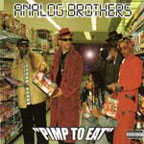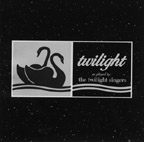|
The Analog Brothers project has been billed as a collaboration between Ice-T and Kool Keith. And it is. Kinda. In reality, Pimp To Eat comes off more as a Kool Keith record with Ice-T showing up as a guest vocalist. While Ice-T's presence is readily felt, it is Kool Keith's overall style which is most resonant. From the simplicity of the beats to the subtlety of the keyboards and effects, Pimp To Eat is familiar territory for Kool Keith fans. The first single, "2005," features a fat synth-bassline coupled with a mellow keyboard groove, and the results are wickedly funky. This track is especially interesting because it manages to blend a futuristic theme with an old-school feel to great effect. The futuristic theme continues to a lesser extent two tracks later, on "Silver Surfer Vs. Analog Annihilator." Unfortunately, though, other than the aforementioned tracks, as well as "Country Girl" and "War", much of the rest of Pimp To Eat is rather bland. Kool Keith has done better work, whether under that moniker, or that of one of his alter-egos (Dr. Octagon, Dr. Doom). Ice-T has fared better as well, although one would have to go back to 1992's The Iceberg to prove it. "2005", though, is a masterpiece. That track alone makes this disc almost worth buying. Almost. -Matt Dacey
 EMMYLOU HARRIS EMMYLOU HARRIS Red Dirt Girl Nonesuch Records Ever since Gram Parsons died at 27, Emmylou Harris has carried his torch for country that is influenced by rock, blues, and soul. With her last studio album, Wrecking Ball, she opted for a more ethereal sound, interpreting the songs of Steve Earle, Lucinda Williams, Neil Young and Jimi Hendrix with a sound that belonged solely to her. Daniel Lanois produced that album, and although he didn't work on her latest, Red Dirt Girl, it is an evolution of that sound - more powerful and more authentic. The biggest difference on Red Dirt Girl is that Harris wrote or co-wrote every song except one. The new album is one of her personal masterpieces. The poignancy of the songs coupled with what has become her original sound is a perfect example of what can come about when experience is guided by passion. Songs like "The Pearl" and "Michelangelo" stand out as definitions of what this album should do, but the sin and guilt of country come pounding home with "I Don't Want to Talk About It Now." She hits a peak with the title song, a ballad about a big dreamer who never makes it out of her small Alabama town. Harris tackles the subjects of sadness and pain, broken love and lost dreams, romanticism and mysticism, and she does it better than she's ever done. -Steven Tweddell
Like an alt-rock mystic, Greg Dulli has returned with an intricate and poetic semi-solo project. Joined by members of Pigeonhed and Howlin' Maggie, Dulli presents compositions that are far more complex than anything he's done with the Afghan Whigs. These tracks twist and turn with dark and beautiful accompaniment as the Twilight Singers successfully weave a rich tapestry of pristine soundscapes and sonic theatricality. "The Twilite Kid" begins like an Angelo Badalamenti piece with gentle piano and weepy mellotron, but shifts as looped drums and synthesizers jump in. The hypnotic "Annie Mae" thrives on howling vocals and addictive percussion. Prince-style beats propel "Clyde and "Railroad Lullaby" while "That's Just How That Bird Sings" features Ben Harper-ish vocals and a Nick Drake sensibility. "Love" twinkles and pulsates as Dulli's vocals resonate in a low, haunting warbling. Recorded in a haunted New Orleans mansion between dusk and dawn, Twilight emerges as a seductive collection of songs and serves as a meditation on relationships in decline. Sordid and sultry, nearly every track oozes with a bizarre sensuality and a paralyzing honesty. Co-produced with British remix masters Fila Brazillia, Dulli has crafted an impressive and personal album, the perfect soundtrack to accompany any state of imperfect clarity. -Chris Webb
|
||
|
|
 ANALOG BROTHERS
ANALOG BROTHERS  THE TWILIGHT SINGERS
THE TWILIGHT SINGERS